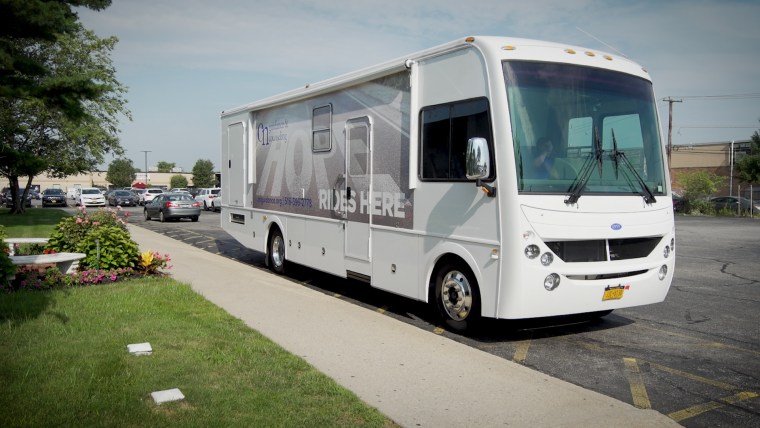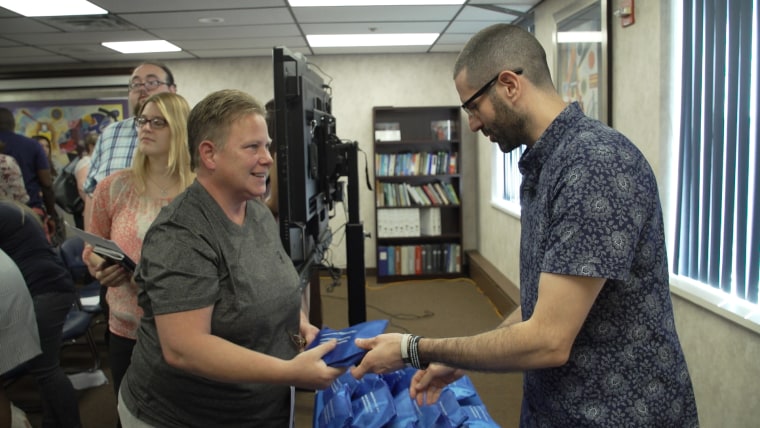Every weekday, an RV cruises through Long Island with a unique destination: anywhere they can find people who struggle with drug addiction.
On board are doctors, counselors and peer advocates, or people who have experienced living through drug abuse firsthand. They're looking to meet these people exactly where they are — physically and emotionally.
"Mobility is important because so many individuals have barriers of getting to treatment," Keisha Graham-Wilson, the director of the CN Guidance and Counseling Services mobile unit in Hicksville, New York, told TODAY. "Many times, individuals we're working with may not have a license. Their license may have been suspended. Transportation on Long Island can be difficult at times. So the fact that we can bring services to individuals really takes out that barrier that some people having of getting help."

The beauty of the RV is that it can go anywhere the mobile clinic is needed. The staff often parks it where they find people who need help with addiction — outside bus stations or the county's probation office or jail. The mobile unit also includes two SUVs to transport people from their homes to the RV for treatment.
Mobile recovery units are becoming more common. Thanks to federal funding, many cities across the country are bringing addiction services to the streets, to help stop overdose deaths. Mary Silberstein, division director of integrated counseling and recovery services at CN Guidance, wants more cities to commission mobile units to help people with addiction in their own communities.
"Having this type of program is phenomenal because it's allowing people who don't want to go into a clinic to get help," Silberstein said. "We're able to go beyond our four walls."
When you can share your own broken moments with them ... walk them through what it looks like to come out the other side of that, there's a trust that's built.
Joe Cavallo, peer advocate
Inside the RV, people can connect with doctors, talk to counselors, access mediation if needed and get help creating a plan for moving forward. Many with substance abuse disorders say just speaking to a peer, someone who knows what they're going through, is helpful.
"Traditionally, (when) meeting with a drug-and-alcohol counselor or a social worker, there's this dynamic of clinician to client — there's kind of like a hierarchy in this relationship, in this conversation," said Joe Cavallo, a certified recovery peer advocate with the mobile unit, who is in long-term recovery himself.
"On a peer-to-peer level, you're just talking to somebody authentically," he continued. "So when you can share your own broken moments with them and kind of get on an even playing field, and be able to walk them through what it looks like to come out the other side of that, there's a trust that's built."
People struggling with addiction might be hesitant to disclose what drugs they're on to a doctor, but more willing to open up to someone who's been in their same situation, he added.
Thomas Ingenito is one of CN Recovery's success stories, and a client of Cavallo's. He said he started using drugs at age 15 and has overdosed 11 times. Now 24, he said he’s been clean since December 2018 — his longest sober streak yet.
Cavallo, who also used drugs throughout his teens and got sober at age 28, said he knows the cycle of struggle and achievement all too well.
"Joe's been where I'm at," Ingenito said. "He has a lot of experience and the tools to deal with addicts in recovery. When I first met Joe, it was an instant connection."
Most of the mobile unit's visitors are addicted to opioids, including heroin and fentanyl, and prescription painkillers such as oxycodone.
Like many places across the country, Long Island has been in the midst of an opioid epidemic. But in recent years, the number of opioid-related deaths has declined. According to data from the Nassau County medical examiner's office, fatal heroin overdoses decreased nearly 25 percent between 2016 and 2018. Officials said one reason is the increased focus on training people to use naloxone, a drug that can be used during an overdose to reverse its effects.

CN Guidance also hosts naloxone trainings for the community and provides anyone who visits the mobile unit with a kit containing Narcan, a brand of naloxone, and instructions on how to administer the drug.
Karen Whilt was among the participants at a recent training in Hicksville.
"Overdoses are a dime a dozen," said Whilt, who abused prescription drugs for 25 years. "They're everywhere now. And unfortunately, I know so many people that are still doing drugs. I just thought it was important to have the Narcan can. That way if something happens, I'm ready to help them and hopefully save a life."
Whilt said she recently celebrated two years clean.
"It's been a long haul," she said. "But I have to tell you, it's been the best two years of my life."

